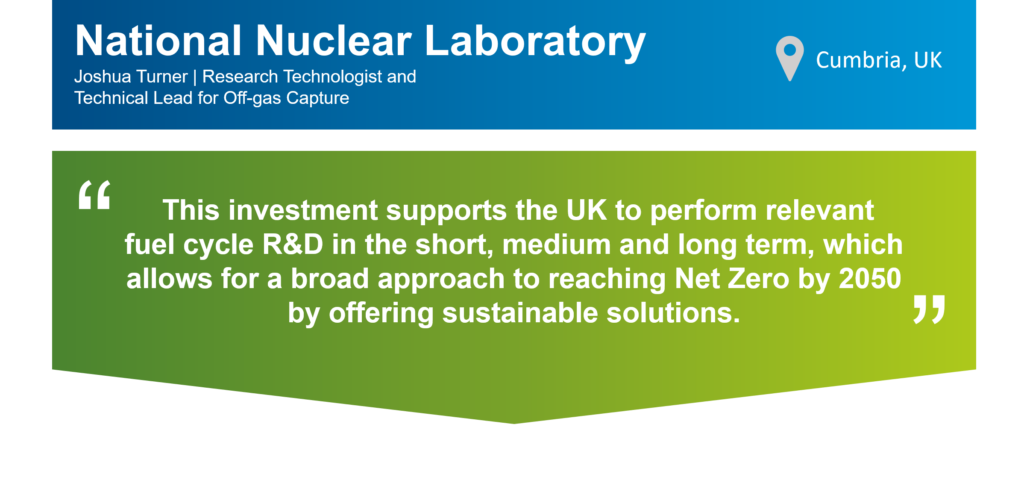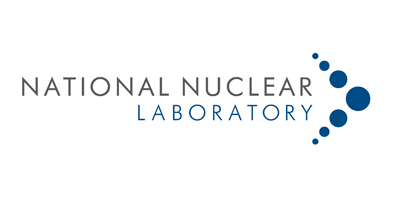Quality investment for improved iodine understanding
NNL | OFF-GAS CAPTURE | WORLD-CLASS FACILITIESAFCP’s Off-gas Capture project is key to ensure that environmental protection remains at the centre of future fuel deployment. Joshua Turner, the project’s Technical Lead, shares how infrastructure investment at the National Nuclear Laboratory (NNL) and the University of Leeds is ensuring that the UK maintains the right skills and facilities to address the off-gas iodine challenge.

Challenge
Inconsistent funding hinders timely innovation
Alongside advanced fuel cycle capability, the UK is delivering world-leading science and technology solutions to deliver a sustainable future recycle option. Within AFCP’s recycle and sustainability focus, the Off-gas Capture project is key to ensure that environmental protection remains at the centre of future fuel deployment.
Our project is exploring the management of iodine for advanced fuel cycles. Of the atmospheric products that arise during recycling, those involving iodine are some of the most significant. Because I-129 has a long half-life and high levels of interaction with the human body, effectively managing these products is essential for safe recycle solutions.
In the past, experimental work to develop iodine waste forms has been sporadically carried out, so our understanding has been slow to progress. Without funding, our ability to move closer to a pragmatic off-gas capture solution is uncertain.
Solution
Holistic approach to iodine management
AFCP funding has enabled the National Nuclear Laboratory (NNL) to coordinate projects that consider the whole life cycle of iodine within recycling. We are considering where iodine is generated through to its ultimate disposal form as an integrated package. This can then fit into the wider fuel cycle and uniquely allows NNL to coordinate activities.
For example, NNL is planning a MOx dissolution test for the future, which can also be used as an opportunity to validate iodine behaviour under real conditions. Active facilities where dissolution tests can be safely carried out are rare, with few countries able to perform such experiments. Without the unique active capability, it is challenging to demonstrate understanding of these complex processes, such as iodine behaviour in the dissolver.
To support these capabilities, AFCP’s infrastructure investment is coordinating activity and skill development at NNL’s facilities, including leveraging the HIP Rig in NNL’s Workington Lab. Additionally, AFCP has finished work on the solid sorbent capture rig at the University of Leeds. Together, supporting skills and technology at these facilities will enable further investigation into this essential off-gas capture field.
Impact
Contributions to Net Zero by advancing understanding
AFCP’s Off-gas Capture project it is worth around 1.5% of NNL’s typical revenue in recent years. AFCP funding has enabled NNL to establish the skills needed to handle active material (Technetium-99) at its facilities. This will enable researchers to undertake other experiments involving volatile active species in the future. This is important because NNL’s facilities have been designed to manage typically higher activity levels than at other places in the UK, enabling greater flexibility in experimental design.
Without such funding in place, maintaining capability to support the development of credible aerial abatement and wasteform options becomes more challenging. Moving beyond iodine, investment into advance C-14, Kr-85, H-3, particulate and NOx technology development will broaden the options available and help achieve a vision of near zero discharge.
This work helps support the creation of a sustainable fuel cycle that considers fuel through to disposal. It will provide skills and capability to develop advanced abatement and wasteform options. This investment supports the UK to perform relevant fuel cycle R&D in the short, medium and long term, which allows for a broad approach to reaching Net Zero by 2050 by offering sustainable solutions.
AFCP is part of the Department for Business, Energy and Industrial Strategy (BEIS) £505m Energy Innovation Programme.
